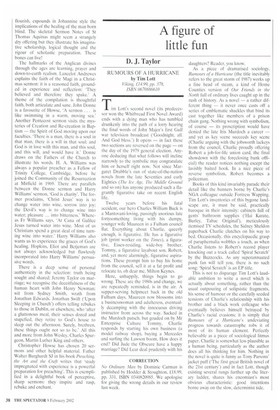A figure of little fun
D. J. Taylor
RUMOURS OF A HURRICANE by Tim Lott Viking, 114.99, pp. 378, ISBN 0670886610 Tim Lou's second novel (its predecessor won the Whitbread First Novel Award) ends with a dying man who has tumbled drunkenly into the path of a lorry hearing the final words of John Major's first Gulf war television broadcast ('Goodnight. all. And God bless.') It opens — in fact these two sections are reversed on the page — on the day of the 1979 general election. Anyone deducing that what follows will incline narrowly to the symbolic may congratulate him or herself right now. Not since Margaret Drabble's run of state-of-the-nation novels from the late Seventies and early Eighties (The Ice Age, The Middle Ground and so on) has anyone produced such a flagrantly figurative take on recent English life.
Twelve years before his fatal accident, our hero Charles William Buck is a Mantovani-loving, passingly uxorious late fortysomething living with his dumpy. younger wife Maureen in a Fulham council flat. Everything about Charlie, queerly enough, is figurative. He has a figurative job (print worker on the Times), a figurative, Essex-residing, wide-boy brother. Tommy, a figurative layabout son, Robert, and, yet more alarmingly, figurative aspirations. These prompt him to buy his home from the council, sell it at a fat profit and relocate to, oh dear me, Milton Keynes.
Here, unhappily, things begin to go wrong. These are the 1980s and change, we are repeatedly reminded, is in the air. A supper-serving helpmeet back in the old Fulham days, Maureen now blossoms into a businesswoman and adulteress, eventually decamping with the innocuous driving instructor from across the way. Sacked in the Murdoch putsch. but goaded on by Mr Enterprise Culture Tommy, Charlie responds by starting his own business (a model railway shop), buying a Mercedes and surfing the Lawson boom. How does it end? Did Jude the Obscure have a happy marriage? Did Lear deal prudently with his daughters? Reader, you know.
As a piece of dramatised sociolog, Rumours of a Hurricane (the title inevitably refers to the great storm of 1987) works up a fine head of steam, a kind of Home Counties version of Our Friends in the North full of ordinary lives caught up in the rush of history. As a novel — a rather different thing — it never once casts off a series of emblematic shackles that bind its cast together like members of a prison chain gang. Nothing wrong with symbolism, of course — its proscription would have denied the late Iris Murdoch a career — and yet as key scene succeeds key scene (Charlie arguing with the jobsworth lackeys from the council, Charlie proudly offering Robert a job-for-life union card, the final showdown with the foreclosing bank official) the reader notices nothing except the lavishly baited hook. In a nice piece of reverse symbolism, Robert becomes a policeman.
Books of this kind invariably parade their detail like the banners borne by Charlie's NGA colleague outside Fortress Wapping. Tim Lott's inventories of this bygone landscape are, it must be said, practically baroque in their intensity: cabinets full of gents' bathroom supplies (Hai Karate, Burley, Tabac Original'), meticulously itemised TV schedules, the Sidney Sheldon paperback Charlie clutches on his way to bed. Occasionally, this encyclopaedic grasp of paraphernalia wobbles a touch, as when Charlie listens to Robert's record player knocking out a track called 'Spiral Scratch' by the Buzzcocks. As any superannuated punk fan will tell you, there is no such song: 'Spiral Scratch' is an EP title.
This is not to disparage Tim Lott's laudable ambition to write a novel which is actually about something, rather than the usual outpouring of solipsistic fragments, his sense of humour or the carefully seeded tensions of Charlie's relationship with his brother and a black work colleague who eventually believes himself betrayed by Charlie's racial evasions; it is simply that Rumours of a Hurricane's undeviating progress towards catastrophe robs it of most of its human element. Perfectly believable as a piece of sociological litmus paper. Charlie is somewhat less plausible as a human being, particularly as the author does all his thinking for him. Nothing in the novel is quite is funny as Tony Parsons' jacket puff ('The first great British novel of the 21st century') and in fact Lott, though existing several rungs further up the literary ladder, shares his encomiast's most obvious characteristic: good intentions borne away on the slow, determinist tide.






































































 Previous page
Previous page